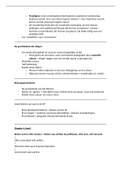Overig
Samenvatting met aanvullende werkcollege aantekeningen hoofdstuk 4-5 en conclusie van 'Thinking about history' van Maza
Samenvatting van 'Thinking about history' van Maza met aanvullende aantekeningen uit werkcolleges. Nuttig voor de vakken 'Inleiding geschiedkunde' en 'Basiscursus onderzoek internationale betrekkingen in historisch perspectief'. Geschreven in 2022/2023 aan de Universiteit van Utrecht.
[Meer zien]





